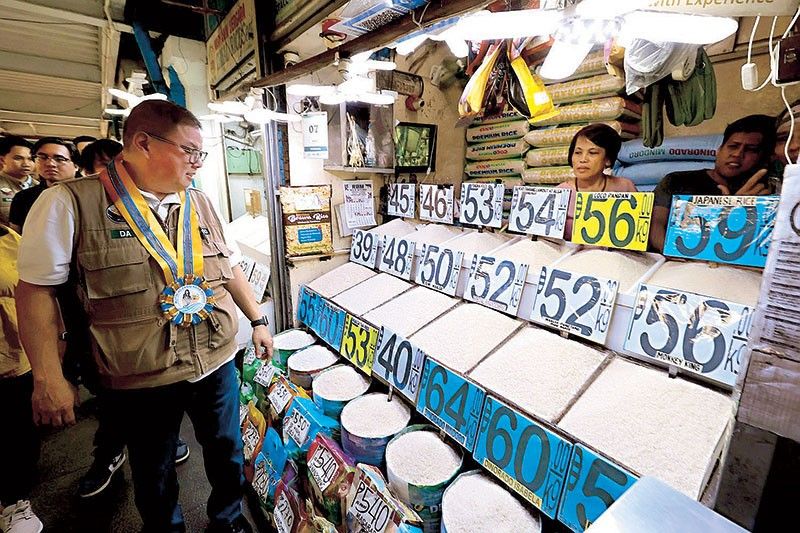Food Emergency for Rice Proposed
Urgent call for a food security crisis on rice to stabilize prices and support Filipino farmers, as the National Price Coordinating Council pushes for action.

Agriculture Secretary Francisco Tiu Laurel Jr. has welcomed a new initiative aimed at stabilizing rice prices in the Philippines, emphasizing its alignment with the Department of Agriculture’s (DA) dual goals of keeping rice affordable for consumers while ensuring profitability for local farmers. As part of these efforts, the DA has set a maximum suggested retail price (MSRP) of ₱58 per kilo for imported rice, which will take effect on January 20, 2024. This measure is designed to curb price fluctuations and provide relief to Filipino households, particularly those in lower-income brackets.
Addressing Price Fluctuations
During a recent meeting of the National Price Coordinating Council (NPCC), officials stressed the urgency of addressing rice price volatility to protect consumers and support farmers. The government reaffirmed its commitment to balancing food security with sustainability in the agricultural sector. DTI Secretary Alfredo Pascual reiterated the Department of Trade and Industry’s full support for the DA’s initiatives, stating that the DTI would assist in monitoring and enforcing the new price regulations to ensure compliance.
The Role of the NFA
Under the Rice Tariffication Law (RTL), the National Food Authority (NFA) is restricted from controlling the rice trade or selling directly to consumers. Instead, its primary role is to purchase palay (unhusked rice) from local farmers and maintain national buffer stocks. However, declaring a food security emergency would allow the NFA to distribute its reserves and sell rice directly to the public, providing immediate relief to consumers and helping to stabilize market prices.
Currently, the NFA holds 300,000 metric tons (MT) of rice in reserve. Releasing these stocks could help lower market prices and free up storage space, enabling the agency to purchase more palay from local farmers during the next harvest season. This move would not only support farmers but also ensure a steady supply of affordable rice for consumers.
Rice Prices and Inflation
Agriculture Secretary Tiu Laurel highlighted the significant impact of rice prices on inflation, noting that rice accounts for 10 percent of an average Filipino household’s budget—and up to 20 percent for lower-income families. As a result, the DA remains focused on reducing retail prices to protect consumers and mitigate the broader economic effects of rising food costs. Lower rice prices could also influence the Bangko Sentral ng Pilipinas (BSP)’s interest rate policies, as food inflation plays a critical role in shaping monetary policy decisions.
A Balanced Approach
The DA’s efforts reflect a balanced approach to addressing the challenges facing the agricultural sector. By setting a price ceiling for imported rice and exploring ways to release NFA reserves, the government aims to stabilize the market while supporting local farmers. These measures are part of a broader strategy to ensure food security, promote sustainable agriculture, and protect the interests of both consumers and producers.
Looking Ahead
As the new MSRP for imported rice takes effect, the government will continue to monitor market conditions and enforce price regulations to ensure compliance. The DA, in collaboration with the DTI and other agencies, remains committed to finding long-term solutions to the challenges of rice production, distribution, and pricing. By working together, stakeholders can create a more resilient and equitable agricultural system that benefits all Filipinos.
In the meantime, the release of NFA reserves and the implementation of price controls offer a glimmer of hope for consumers struggling with high rice prices. These measures demonstrate the government’s proactive approach to addressing food security and inflation, ensuring that rice—a staple of the Filipino diet—remains accessible and affordable for all.
Link Source: https://www.manilatimes.net/2025/01/17/news/food-emergency-for-rice-proposed/2040230
What's Your Reaction?












/https://tf-cmsv2-smithsonianmag-media.s3.amazonaws.com/filer_public/54/66/546650fa-26a4-40fd-8d6d-5a7a04540f81/rosetta2.png)
:max_bytes(150000):strip_icc():focal(999x0:1001x2)/robert-prevost-050825-1-39395418ab494da5a3a700c9478e66c8.jpg)















































format(webp))
format(webp))


























